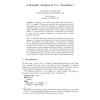Free Online Productivity Tools
i2Speak
i2Symbol
i2OCR
iTex2Img
iWeb2Print
iWeb2Shot
i2Type
iPdf2Split
iPdf2Merge
i2Bopomofo
i2Arabic
i2Style
i2Image
i2PDF
iLatex2Rtf
Sci2ools
96
Voted
ECOOP
2006
Springer
2006
Springer
A Semantic Analysis of C++ Templates
Templates are a powerful but poorly understood feature of the C++ language. Their syntax resembles the parameterized classes of other languages (e.g., of Java). But because C++ supports template specialization, their semantics is quite different from that of parameterized classes. Template specialization provides a Turing-complete sub-language within C++ that executes at compile-time. Programmers put this power to many uses. For example, templates are a popular tool for writing program generators. The C++ Standard defines the semantics of templates using natural language, so it is prone to misinterpretation. The meta-theoretic properties of C++ templates have not been studied, so the semantics of templates has not been systematically checked for errors. In this paper we present the first formal account of C++ templates including some of the more complex aspects, such as template partial specialization. We validate our semantics by proving type safety and verify the proof with the Isabe...
C++ Templates | ECOOP 2006 | Parameterized Classes | Programming Languages | Template Specializations |
Related Content
| Added | 22 Aug 2010 |
| Updated | 22 Aug 2010 |
| Type | Conference |
| Year | 2006 |
| Where | ECOOP |
| Authors | Jeremy G. Siek, Walid Taha |
Comments (0)

